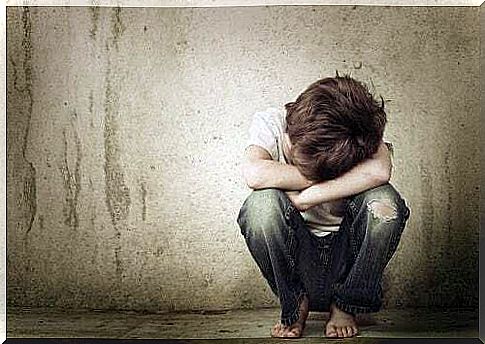Early Deprivation And Psychopathology

One of the great aims of psychology in the experimental field is to discover the origin of psychopathology, or psychological disorders. Among the different factors that affect it is early deprivation.
It is certainly a very ambitious goal, since it is not only the genes that determine the appearance of one disorder rather than another; its combination, ie the phenotype, explains the appearance of a psychopathological disorder or not. But the environment also plays an essential role in the development of the individual. Some relevant aspects of the environment that can influence the phenotype are upbringing, family habits or, as presented in this article, early deprivation.
The early deprivation studied in relation to the emergence of psychopathology refers to the precariousness, lack of care, stimuli or hunger suffered during the age of development. Numerous studies have highlighted the relationship between these two constructs through longitudinal studies and analyzing concepts such as resilience.
One such research presented by Sonuga et al. in 2017 he investigated the phenomenon of the mass adoption of Romanian children by British families during the fall of the dictator Nicolae Ceausescu.
Early deprivation: the Romanian case
In this longitudinal study, which followed a sample of children from adoption to adulthood, the early deprivation experienced in overcrowded orphanages included lack of cognitive and social stimulation, hunger, lack of personalized care and hygiene.
The Romanian context was bleak. Ceausescu had tried to pay off the debt accumulated by the country due to its rapid industrialization by exporting all agricultural production, giving life to a nation that, after the civil war, was dying of hunger. This is why the early deprivation in orphanages during the fall of the dictator was so incisive.

Research groups
The research involved three groups: the first two were made up of Romanian children who had suffered deprivation in orphanages and who had been adopted by British families at different times. The children in the first group had been deprived for less than six months, while those in the second group for more than six months before being adopted.
There was a third control group consisting of adopted children who had not suffered deprivation; in this case they were orphans of English nationality adopted by British families.
The study consisted of evaluating children between the ages of six, eleven and fifteen. Subsequently, an additional evaluation criterion was also included, namely when adolescents became young adults to measure emotional management during such a difficult stage.
Psychopathological symptoms detected
The psychopathological characteristics or disorders measured in the study are:
- Disorder of uninhibited social relations.
- Autism spectrum disorder (especially communication problems and obsessions).
- Inattention and hyperactivity.
- Cognitive impairment.
- Disorders of mood and behavior (especially during adolescence).
The Results: Does Early Deprivation Affect?
Once the analysis of Romanian children in the different ages and phases of the study was concluded, it seems that the three initial hypotheses found empirical support:
- The control group and the least disadvantaged group had similar psychopathological symptoms at all ages.
- The group affected by the major deprivation presented psychopathological symptoms despite having received the necessary treatment after the adoption.
- Emotional problems that appeared during adolescence and adulthood were more severe in the most deprived group.
Furthermore, more children with different psychopathological symptoms were observed in the group with greater deprivation . 34% of the children in this group had symptoms at all ages, a percentage that decreased as they became young adults.
During this period, only 25% of young people in the most disadvantaged group had a psychopathological trait. The psychopathologies that most affected the most disadvantaged group, compared to the other two groups, were symptoms related to autism spectrum disorder, the disorder of uninhibited social relations, inattention and hyperactivity.
Other interesting facts concerned the lifestyles of young adults in all three groups. Young people who suffered the most deprivation in childhood did not continue or dropped out of education and had a higher unemployment rate.
Furthermore, young people in the same group have made greater use of mental health services – psychological and psychiatric – at all ages. Finally, in the group that suffered the most deprivation, there were three individuals with borderline personality disorder, two with bipolar disorder and two with psychosis.

Future approaches derived from this research
The results of this study showed the existence of a relationship between early deprivation in the early stages of development and psychopathological symptoms, at least those evaluated here. But the interesting thing is not limited to having found this relationship, but also has to do with what can be done in the form of psychological intervention.
In the most disadvantaged group, a small percentage of children – 15 to be exact – did not have any disorders at any of the ages evaluated. This calls into question genetic studies, epigenetics and resilience, which may explain why, although they suffered from deprivation, they did not develop disorders like others. Furthermore, it helps us to clarify what strategies to implement to ensure that a child can develop adequately despite a past characterized by great deprivation.
Regarding cognitive decline, it seemed to balance with age in the three groups. Such a result precipitates interest in studies of children’s neuroplasticity and how the brain compensates for replacements.
For their part, the results of emotional problems, much more marked in adolescence, could be related to a latent vulnerability caused by the stress suffered by children.
The fields of study resulting from this research look promising. In this regard, a measure that can already be implemented on the basis of these results is certainly that of providing children who are victims of premature deprivation with a continuous and quality psychological service. Then, once they are part of the adoptive family, it is worth paying particular attention to the disorders diagnosed in the poorest group, focusing therapy on related difficulties.









